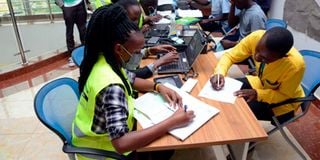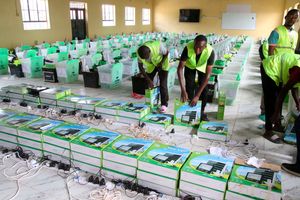Premium
Kenyans in diaspora threaten to sue IEBC over voter listing

IEBC clerks register students during the launch of voter listing of college students at UoN Towers at the University of Nairobi on October 13, 2021.
Kenyans in the diaspora have taken issue with the Independent Electoral and Boundaries Commission (IEBC) over the change of voter registration rules ahead of the exercise which commences later this month in various parts of Europe, Middle East and United States of America.
The diaspora community in the USA has threatened legal action for being left out in IEBC’s first voter registration exercise in 2021.
“We are appalled to learn that the commission has unilaterally changed the dates for this new exercise in the diaspora, while the communication given to diaspora groups was different. This will further create confusion, especially as the electoral commission has failed to provide details on the registration exercise,” a statement signed by Kenya Diaspora Alliance (KDA-USA) president, Dr Bernard Marasa said.
Dr Marasa accused IEBC of shifting goal posts and had unilaterally changed guidelines on voter registration requirements allegedly to lock out a number of eligible voters in the diaspora from registering ahead of the August 9 General Election.
Registration process
He claimed that the electoral agency was out to disenfranchise the diaspora community from participating in the next polls through suppression of the voter registration process.
“KDA-USA has read with dismay the statement from the chair of the IEBC regarding preparations for the 2022 elections, in particular voter registration, for Kenyans living in the Diaspora. KDA-USA would like to point out three key issues where the commission is deliberately violating its own election regulations, precedents, the Elections Act and the Constitution of Kenya,” said Dr Marasa who issued the statement from Washington DC.
The KDA-USA president noted that the law was clear that a National Identification card or passport would be required to register as voters.
False powers
However, he noted, that the commission had ‘arrogated to itself false powers’ to establish two sets of diaspora voter registration rules where it would accept National Identification cards for Kenyans domiciled in the East African region, but demands that only passports would be acceptable for those living outside East Africa , particularly those in the US, Europe and elsewhere.

Kenya Diaspora Alliance -USA president Bernard Marasa.
“This is illegal, discriminatory and a violation of the constitutional rights of Kenyans in the diaspora. It is one more attempt by the IEBC to disenfranchise Kenyans in the diaspora,” read the statement by KDA-USA on diaspora voting.
Potential voters in the diaspora also noted that IEBC spent thousands of tax-payers money to conduct a mapping exercise of Kenyans in the US and other countries.
They expressed dismay that after the mapping exercise, the commission seemed to have concluded that a majority of Kenyans in the USA live in Washington DC, New York and Los Angeles.
“A simple search of the policy papers by renowned international agencies, including the United Nations International Organisation for Migration (IOM) would have revealed to the IEBC that a majority of Kenyans live in the great States of Minnesota, Texas, New Jersey, Pennsylvania, North Carolina, Delaware, Massachusetts, Georgia, and Illinois among others,” read the statement.
The statement pointed out that the Elections Act provides for continuous registration of voters, but despite this fact, IEBC has not registered voters in the diaspora since 2017 when the exercise was meant to commence, which clearly violates election laws.
Dr Marasa noted that the two weeks which IEBC had set for the Kenyan diaspora community to complete voter registration is not sufficient to capture all eligible voters.
“We demand that the IEBC addresses the issues raised by KDA-USA expeditiously. We shall use all means available, including courts to defend and protect the rights of Kenyans living in diaspora,” warned Dr Marasa.
In December last year, IEBC announced that more Kenyans living in the diaspora will be allowed to vote during the 2022 election, but they would only participate in the presidential election.
This is the first time in more than a decade since the promulgation of Kenya’s new Constitution, which guarantees Kenyans in the diaspora to participate in the electoral process.
Dr Marasa said the decision by IEBC to confine the voter registration in Kenyan consulates overseas was hypocritical, noting that in 2017, the commission gazetted various hotels in some East and Southern African countries which became voting centers.
He wondered why the commission was employing double standards when it came to dealing with Kenyans living in Europe, USA and other far-flung areas.
The announcement was made by IEBC commissioner Justus Nyang’aya during his Zoom conference in Washington, DC when he commissioned an electoral mapping exercise in North America.
Mr Nyang’aya said the commission was conducting electoral mapping exercises in various parts of the US, Canada, Europe, and the Middle East, as a first step to create polling centers where Kenyan citizens living in the overseas regions shall vote in the 2022 presidential elections.
During an earlier interview with journalists, IEBC chairman Wafula Chebukati said they would add six more countries to the five, which had met the threshold to participate in the election.
In 2017, Kenyans in Uganda, Tanzania, Rwanda, Burundi and South Africa participated in the presidential election.
The IEBC chairman noted that the countries had met the 3,000 voter’s requirement to be enlisted as a polling centre.
"We have many Kenyans in the diaspora but the majority had no requisite details to be enrolled to vote. Some are illegally in those countries," noted Mr Chebukati.
The announcement was received with mixed reactions, as some Kenyans in North America described it as “tokenism” that did not go far enough to implement the constitutional imperatives that guarantee the right for Kenyans in the diaspora to vote in the general election.
Mr Nyang’aya said the commission will simultaneously register diaspora voters in select countries across the globe, including the US, in January, at its existing diplomatic facilities.
“The registration and voting will happen “on Kenyan soil” in line with the Constitution’s directive to the IEBC to progressively actualise the diaspora’s right to vote,” said Mr Nyang’aya.
Mr Nyang’aya, who led other IEBC officials, said that in the case of the US, diaspora voter registration will occur at the Kenyan Embassy in Washington, DC and two consulates in Los Angeles and New York.
He said the voting will also take place at these same “Kenyan soil” sites in the 2022 election.
The IEBC commissioner stated that he and his team are currently in the US to assess the situation on the ground, consult with Kenyan stakeholders in the country on the diaspora vote issue and set the ball rolling to facilitate the ever first Diaspora vote.
Mr Nyang’aya said due to past low voter turnout when Kenyans domiciled in East Africa were allowed to participate in the elections, the exercise will remain confined to the presidential elections.
“The law strictly controls how the IEBC conducts elections, including implementing the diaspora right to vote,” said Mr Nyang’aya, who added “the electoral agency has very little leeway on this issue unless Parliament amends the relevant laws to make it easier for the diaspora to vote.”
Mr Nyang’aya appealed to Kenyans overseas to petition their National Assembly representatives to review the law to make it easy for IEBC to implement the constitutional obligation that guarantees Kenyans in the diaspora to vote.





